Despite a busy start to the surf season, there was only one notable injury, said Surf Life Saving NZ Eastern regional manager Chaz Gibbons-Campbell.
“Mount Maunganui had a dislocated shoulder yesterday. But other than that, it’s been pretty quiet,” he said.
There were fewer people on Saturday than expected for the start of the season, but on Sunday, the beachgoers were out in force.
“Everybody’s starting to pick up and head home.”
Some beaches on patrol this weekend go back into hibernation until December.
“Tirua, Pāuanui, Onemare, and Whitiroa and our other big clubs are going to be on patrol every weekend through until the end of March,” he said.
People wanting to use unpatrolled beaches are asked to be highly cautious. Swimmers can check with Safeswim.org.nz to see which beaches are monitored.
“You should see little flag icons. They should be kind of illuminated when the guards are on patrol, and when they finish for the day, it goes white like a greyed-out flag,” he said.
When clicking on the flags, people can see the times the beaches are patrolled and the water temperature.
The site was intended for Auckland only, but Surf Lifesaving New Zealand nationalised it.
“All our patrolled beaches are now listed, and we’re encouraging councils to get the other patrolled beaches on to this platform,” he said.
There were about six to seven patrols across all the clubs that Gibbons-Campell is responsible for, he said.
“I look after 19 clubs, and at the height of summer, we’re patrolling 24 patrol locations.”
He is responsible for beaches stretching from the Coromandel to Gisborne.
Safety on the water will be paramount leading into summer, and Gibbons-Campbell is encouraging swimming to “Know how to float”.
“If you can float on your back in the water, your survival rate increases dramatically.”
“We’re encouraging people to make sure they know how to float, choose a life-guarded beach, and know how to contact help if you need it.”
If you see a swimmer in distress, bring a flotation device like a bodyboard or surfboard to assist them, he said.
Even with the quiet weekend, most clubs ran their lifeguard refreshers, which are annual recertifications.
“They have to do a CPR assessment, first aid assessment, radios and signals, and then they go and do stuff at the pool,” he said.
“They do a 400-metre pool swim, under nine minutes, a tube rescue and a tow and release.”
A tow and release training session trains the lifeguard to safely assist in towing someone without a flotation tube.
“It was great to see so many lifeguards and patrol support completing their refreshes and donning their uniforms,” he said.



0 comments
Leave a Comment
You must be logged in to make a comment.